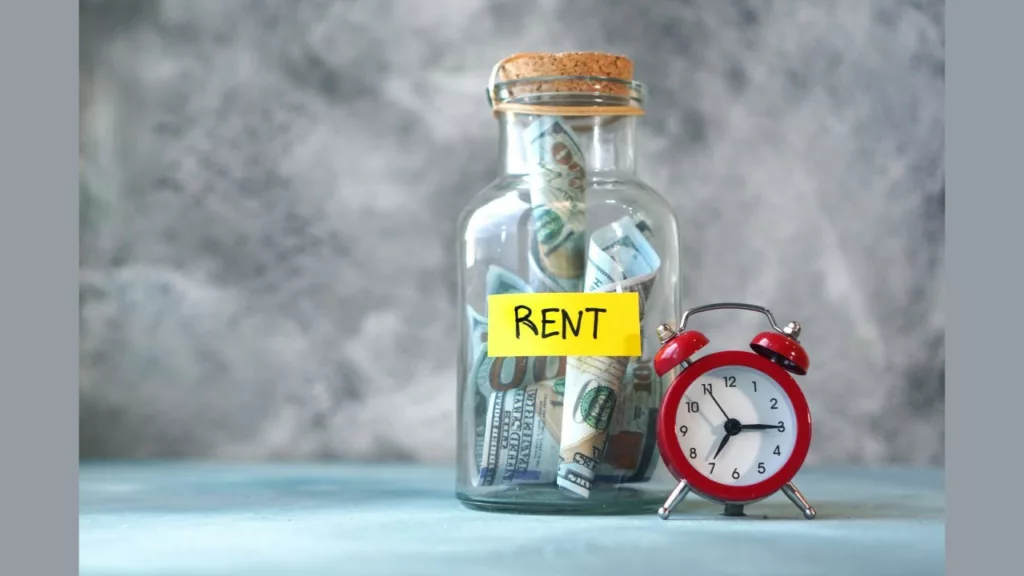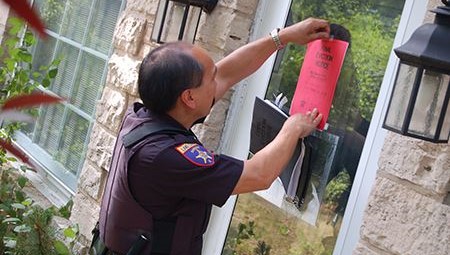A tenant not paying the rent is possibly the worst problem the average landlord will face. Fortunately, it’s a common problem, and there are solutions. I own a property management company, have over 70 rental properties, and have been a landlord for more than 16 years. Over that time, I’ve learned how to deal with a tenant who isn’t paying rent.
When tenants do not pay their rent, you must begin eviction proceedings as soon as legally possible. After that, you can work with your tenant and allow them to get caught up, and the eviction can always be stopped if you have an acceptable arrangement.
In this article, I will explain why this is a huge problem, how to help your tenants stay current, and what you should do when your tenants don’t pay the rent. I’ll explain why starting the eviction process is essential without delay and how that helps you collect past-due rent. I know how to deal with a tenant not paying rent; after reading this article, you will too.
The Impact of Missed Rent

One of the most frustrating situations for a rental property owner is having a tenant not paying rent. It’s worse than having a vacant property because there is no chance of finding a tenant, and wear-and-tear (or worse) is happening to the house. The longer this goes on, the lower the chances your tenant will catch up on the rent and stay.
When rent is not paid, it becomes difficult to cover your expenses. You can’t handle routine property maintenance and may even have trouble paying for insurance and property taxes. If your property has a mortgage, you may be in jeopardy of losing the house.
Below are some of the problems that arise when rent is not paid:
- Cash Flow Challenges: Rent payments are a vital source of income for landlords. When tenants fail to pay rent on time, the landlord’s cash flow can be disrupted. This can make it challenging to cover various expenses associated with the property, including mortgage payments, property taxes, insurance premiums, and maintenance costs. It may also affect the landlord’s ability to meet financial obligations and make necessary repairs or improvements.
- Late Fees and Grace Periods: Many lease agreements include provisions for late fees when rent payments are not made on time. Late fees incentivize tenants to pay promptly and help compensate landlords for the inconvenience caused by delayed payments.
- Security Deposit Deductions: In some cases, landlords may need to deduct unpaid rent from the tenant’s security deposit. However, it is essential to understand the specific laws and regulations governing security deposits in your jurisdiction. Generally, security deposits cover damages beyond normal wear and tear, not unpaid rent. Landlords must follow proper procedures for itemizing deductions and returning any remaining deposit balance to the tenant within the required timeframe.
- Potential Loss of Property: Prolonged non-payment of rent can strain landlords financially, making it difficult to maintain the property and meet financial obligations. In severe cases, landlords may risk foreclosure or the need to sell the property.
Understanding the financial implications of lost rent is crucial for landlords to protect their investments and make informed decisions. By adhering to the terms of the lease agreement, following applicable laws, and maintaining effective communication with tenants, landlords can minimize the impact of non-payment and foster positive tenant relationships.
Help your Tenants Stay Current

It isn’t easy to deal with a tenant not paying rent, so encourage them to pay on time. Establishing a good tenant-landlord relationship built on clear communication and mutual respect can help mitigate non-payment risk. Maintaining open communication lines and promptly addressing any concerns can encourage tenants to fulfill their rental obligations.
The best way to deal with tenants that don’t pay the rent is for all your tenants to pay the rent. Unfortunately, this is not always possible, but there are some things that you can do to help. Here are a few things within your control that will help your tenants stay current.
- Don’t be a Slumlord. Handle maintenance issues promptly. Don’t give your tenant any perceived justification for not paying the rent.
- Don’t be a pushover. You shouldn’t make it easy for tenants to pay late. Make sure you have a significant late fee in place and never waive that late fee.
- Impose Drastic Consequences. When there is not enough money to go around, your tenants must choose which bills to pay. People tend to pay the ones with the greatest consequences and stall the ones they can get away with. You should impose severe consequences if the rent is not paid.
- Don’t have a Grace Period. Expect the rent on the due date. You shouldn’t have a grace period unless your local laws require it. If you want to give the tenant a few extra days, then change the due date.
- Take Action Fast. Don’t let the past due rent balance grow higher. As that balance gets higher than a security deposit and a month’s rent, it becomes cheaper for a tenant to leave.
How to Handle Late Rent Balances
In some instances, despite your best efforts, the tenants end up with a past-due balance due to a problem that has been resolved. There are benefits to letting the tenant stay if you think the payment problem has been resolved. If the tenant stays, you avoid the vacancy and the cost of getting the unit ready for another tenant.
An excellent way to handle a sizeable past-due balance is to issue a new lease agreement, which replaces the current one. This new rental agreement will forgive the past-due balance and raise the rent to recapture the arrears. A slight rent increase is often easier for the tenant to pay than a lump sum for the past due balance. In addition, it’s easier for the landlord to manage than an outstanding late balance that must be addressed monthly.
Legal Considerations: Landlord-Tenant Laws

Remember, the lease is not the final word. State and Local Landlord-Tenant laws always trump the lease agreement.
When dealing with tenants who fail to pay rent, landlords must understand the legal considerations and landlord-tenant laws governing eviction. Properly navigating these legal aspects can protect your rights as a landlord and help ensure a smooth resolution.
- Familiarize Yourself with Local Laws: Each jurisdiction may have specific laws and regulations regarding eviction procedures, notice requirements, and tenant rights. Familiarizing yourself with the landlord-tenant laws in your state or region is essential. This information can usually be found in state statutes or local ordinances.
- Review Your Lease Agreement: A written lease agreement is highly recommended as it sets forth the terms and conditions of the tenancy. Ensure that your lease agreement complies with the applicable laws and includes provisions related to rental payments, grace periods, late fees, and eviction procedures. It should clearly outline the rights and responsibilities of both parties.
- Serve Proper Notices: Before initiating legal action, landlords must typically serve specific notices to the tenant, allowing them to rectify the nonpayment. The specific notice requirements and timeframes may vary by jurisdiction. Below are some standard notices to include:
- Late Rent Notice: Send a written notice informing the tenant of their overdue rent and any associated late fees. Keep a copy of this notice for your records. I send this notice the day after rent is due.
- Three-Day Notice to Pay or Quit: In many jurisdictions, landlords must serve a three-day notice to the tenant, specifying the amount of rent owed and providing a three-day period to pay or vacate the rental unit. I include this with the late rent notice, sent the day after rent is due.
- Notice of Termination: If the nonpayment issue persists, a notice of termination may be required to formally terminate the tenancy. The notice period varies by jurisdiction, typically ranging from 3 to 30 days. I include this in my late rent notice.
- Document Everything: It is crucial to maintain thorough documentation throughout the process. Keep records of all communication; notices served, payment records, and any relevant evidence that may support your case in court, if necessary. Use certified mail with a return receipt or other methods that provide proof of delivery for important notices.
- Consult with Legal Professionals: Depending on the situation’s complexity, it may be beneficial to seek legal advice from a landlord-tenant attorney. They can provide guidance tailored to your specific circumstances and ensure compliance with the law.
- Follow Proper Legal Procedures: If the tenant does not remedy the nonpayment issue or vacate the premises within the specified timeframe, the next step is to initiate legal action. This typically involves filing an eviction lawsuit or an unlawful detainer action in the appropriate court. Adhere to the legal process diligently, including any court filing deadlines, appearing for court hearings, and obtaining court orders, such as a writ of possession.
- Avoid Self-Help Eviction Methods: Taking matters into your own hands, such as changing locks, removing personal belongings, or shutting off utilities, is illegal and can result in significant legal consequences for landlords. Following the legal process and allowing the court to handle the eviction is essential.
- Understand the Financial Implications: Nonpayment of rent can have significant financial repercussions for landlords. In addition to the loss of rental income, there may be court fees, legal costs, and potential damages to address. Familiarize yourself with the laws regarding recovering unpaid rent, security deposit deductions, and pursuing legal remedies for financial losses.
Remember, this section provides a general overview of how to deal with a tenant not paying rent. It is essential to consult your jurisdiction’s specific laws and regulations and seek legal advice when necessary. Landlord-tenant laws can vary, and it is crucial to follow the proper legal procedures to protect your rights and maintain a lawful and professional landlord-tenant relationship.
What to Do When a Tenant Fails to Pay Rent

When tenants miss their rent payment, you must take legal action quickly. A landlord should file for eviction as soon as you are legally allowed. Local and state laws govern evictions; the process varies by municipality. Learn the rules and procedures in your area, and start the eviction process as soon as possible.
Don’t chase the rent; don’t track down the tenants and beg them to pay it. Just send late payment notices and any legal notices required before you can file for eviction. It’s a good idea to start the removal as soon as you can.
The best late notice is the formal eviction notice tacked to the door, and you need this to happen as fast as possible. Evictions can take several weeks (or months), so don’t let several more weeks go by before you start the process. Start the eviction case early, and add court costs to the tenant’s balance.
Filing for the eviction doesn’t mean the tenant has to leave. If the eviction is for non-payment of rent, you can always stop the removal once you resolve the unpaid rent. In many areas, you must stop eviction if you accept any payment; therefore, you should avoid accepting small partial payments. If you take a sizeable partial amount and the eviction process stops, be ready to file again the moment the tenant fails to adhere to any payment arrangement.
Eviction is a Last resort
Eviction is a last resort for landlords, and it should only be pursued when all other attempts to resolve the issue have been exhausted. The decision to evict a tenant is not taken lightly, as it has significant financial implications for the landlord. The eviction process can be expensive, time-consuming and result in additional costs that can impact the landlord’s cash flow and profitability.
During the court phase of the eviction process, tenants often withhold rent, adding to the financial strain for the landlord. This loss of rental income and the expenses associated with legal proceedings can create a significant burden. Additionally, once the eviction is complete, there will likely be a vacancy period while the landlord searches for a new tenant, resulting in further financial losses.
Renovation costs also come into play when a tenant is evicted. Normal wear and tear on the property may need to be addressed, and repairs or updates might be necessary to make the rental unit market-ready again. These costs can add up quickly, impacting the landlord’s budget and profitability.
Keeping this in mind, landlords cannot allow a tenant to remain in the unit without paying rent. The loss of rental income can have severe consequences for the landlord’s financial stability and ability to maintain the property. Ultimately, the goal is to deal with a tenant not paying rent by encouraging the tenant to fulfill their financial obligations and allowing the landlord to maintain a profitable rental business.
Here are some tips for recovering unpaid rent.
Start the eviction process early, as fast as legally possible. But work with the tenant to pay the rent before the eviction is finalized.
The Eviction Process

The eviction process is a legal procedure that allows landlords to regain possession of their rental property when a tenant violates the terms of the lease agreement. It is important to note that state landlord-tenant laws govern the eviction process and may differ by jurisdiction.
While the specific details and timelines can vary, the general steps involved in the eviction process are described below.
- Providing Proper Notice: The first step in the eviction process is to give the tenant proper notice, notifying them of the lease violation or non-payment of rent. This notice serves as a formal communication and typically includes details such as the reason for eviction, the specific violation, the date by which the issue must be resolved, and the consequences if the tenant fails to comply.
- Filing the Eviction Lawsuit: If the tenant fails to address the violation or remedy the situation within the specified time frame, the next step is filing an eviction lawsuit in the appropriate court. The landlord must complete and submit the necessary legal documents to the court. The filing typically includes relevant information such as the reason for eviction, supporting evidence, lease agreement details, and the requested relief.
- Serving the Tenant: Once the eviction lawsuit is filed, it is essential to ensure that the tenant is properly served with the court documents. The documents must be delivered according to the jurisdiction’s legal requirements, including personal service, certified mail, or posting the notice on the rental property.
- Court Hearing: Following the service of the eviction lawsuit, a court hearing is scheduled. During the hearing, the landlord and the tenant can present their case before a judge. The judge will carefully review the evidence, listen to both sides’ arguments, and decide based on the applicable laws and lease terms. Landlords must come prepared with all relevant documentation, such as the lease agreement, payment records, notices, and other evidence supporting their claim.
- Court Order and Enforcement: If the court rules in favor of the landlord, a court order or judgment will be issued outlining the terms and conditions of the eviction. The order will specify the date the tenant must vacate the premises. In cases where the tenant fails to comply with the court order voluntarily, the landlord may need to take further action to enforce the eviction. This may involve working with law enforcement or a professional eviction service to remove the tenant and their belongings from the rental property.
Landlords and property managers must follow proper legal procedures to deal with a tenant not paying rent. It is essential to adhere to state landlord-tenant laws throughout eviction. Failure to do so can result in delays, legal complications, or potential liability for the landlord.
Remember, the eviction process is time-consuming and expensive. When evicting for non-payment, try to find other ways to rectify the issue. Allow the tenant to get caught up, or pay the tenant to move quickly.
Conclusion
This article has laid out the best way to deal with a tenant not paying the rent. I have provided tips you can implement to reduce the likelihood of a tenant getting behind. I’ve also told you how to handle a tenant that doesn’t pay the rent, which is to begin the eviction process quickly but work with the tenant during this process. Finally, I presented a method for handling a sizeable past-due balance if the tenant stays. For more information on investing in real estate, check out my guide that walks you through buying your first rental property.




